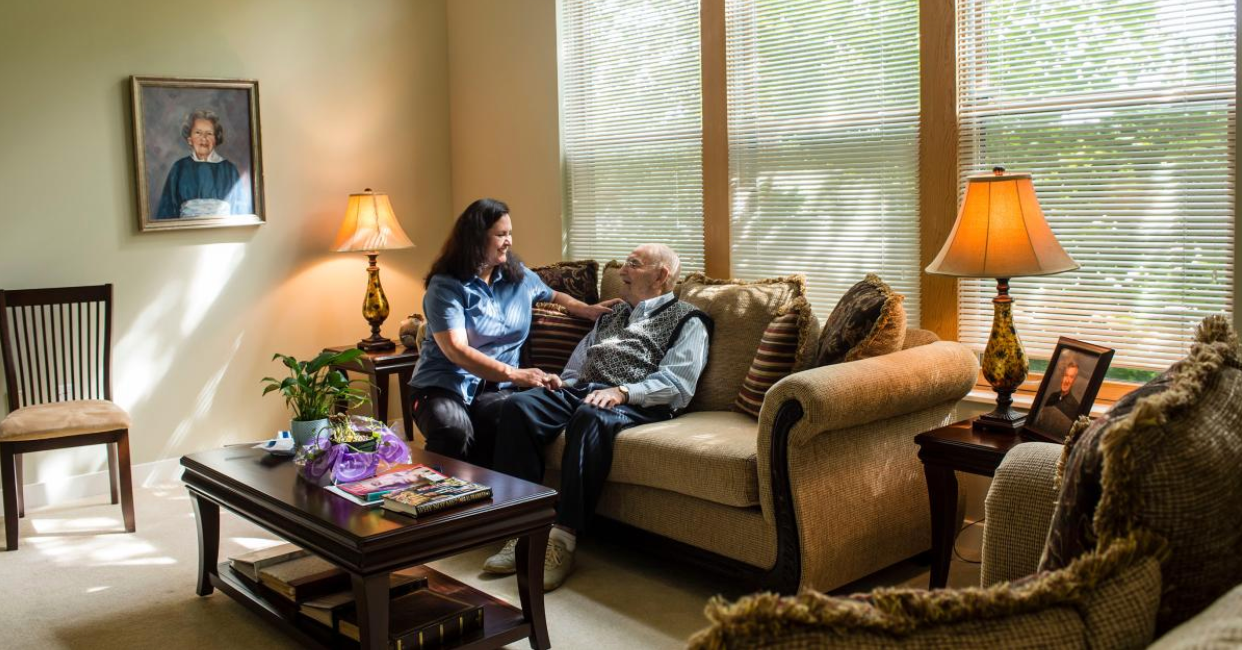What Stage of Dementia is Sundowning?
What Stage of Dementia is Sundowning?
According to
Mayo Clinic "the term "sundowning" refers to a state of confusion that occurs in the late afternoon and lasts into the night. Sundowning can cause various behaviors, such as confusion, anxiety, aggression or ignoring directions. Sundowning also can lead to pacing or wandering. Sundowning isn't a disease. It's a group of symptoms that occurs at a specific time of the day. These symptoms may affect people with Alzheimer's disease and other types of dementia. The exact cause of sundowning is not known."

Are You Searching for a Dementia Home Health Care Agency Near Me?
Dementia is a progressive condition that affects millions of individuals worldwide, impacting not only their cognitive functions but also their daily routines and behaviors. One common phenomenon associated with dementia, particularly in its later stages, is sundowning. In this article, we will explore what sundowning is, which stage of dementia it typically occurs in, and how 7-Day Home Care, a New York-based home health care agency specializing in dementia care, can provide essential support during this challenging time.
Understanding Sundowning and Dementia
Sundowning, a phenomenon commonly associated with dementia, refers to a pattern of behavioral changes and increased confusion that often occurs in the late afternoon or early evening, continuing into the night. Individuals experiencing sundowning may exhibit a range of symptoms, including agitation, restlessness, anxiety, confusion, or even aggression. These symptoms can vary in severity and may present differently depending on the individual and the stage of dementia they are in. Sundowning can be particularly challenging for both the person with dementia and their caregivers, as it can disrupt daily routines, impair sleep patterns, and escalate stress levels. It often manifests as a heightened sense of disorientation or discomfort during the transition from daylight to darkness, leading to increased confusion and anxiety for the individual.
During sundowning episodes, individuals with dementia may become more vulnerable to environmental triggers such as changes in light, noise levels, or disruptions in their daily routine. Factors such as fatigue, hunger, dehydration, or medication side effects can also exacerbate sundowning symptoms. Caregivers may observe increased agitation or restlessness in their loved ones during these times, making it challenging to provide comfort and support. Understanding the triggers and patterns of sundowning is crucial for caregivers to effectively manage and mitigate its impact on the individual's well-being. Implementing strategies such as establishing a consistent daily routine, creating a calming environment, and providing reassurance and companionship can help alleviate sundowning symptoms and improve the overall quality of life for individuals with dementia.
The Relationship Between Sundowning and Dementia
The relationship between sundowning and dementia is intricate, as sundowning is often considered a symptom or manifestation of the cognitive decline associated with dementia. While sundowning can occur in individuals without dementia, it is more prevalent and pronounced in those with dementia, particularly in the middle to late stages of the disease. The exact cause of sundowning in dementia is not fully understood, but it is believed to result from a combination of factors, including disruptions in the circadian rhythm, changes in neurotransmitter levels, and underlying brain pathology. As dementia progresses, individuals may experience increasing difficulty in regulating their behaviors and emotions, leading to heightened sensitivity to environmental stimuli and disruptions in sleep-wake cycles, which can contribute to sundowning episodes. Understanding the relationship between sundowning and dementia is crucial for caregivers and healthcare professionals to provide effective support and management strategies for individuals affected by both conditions.
Identifying the Stage of Dementia
Identifying the stage of dementia with respect to sundowning involves recognizing patterns of behavior and cognitive decline that correlate with the progression of the disease. In the early stages of dementia, individuals may exhibit mild memory loss and cognitive impairment, with occasional episodes of confusion or disorientation. Sundowning symptoms during this stage may be less pronounced or infrequent. As dementia advances to the middle and late stages, cognitive decline becomes more pronounced, and individuals may experience increased difficulty with communication, daily tasks, and memory recall. Sundowning tends to become more prevalent and severe during these stages, often coinciding with other behavioral and psychological symptoms such as agitation, wandering, or hallucinations. Monitoring changes in behavior and cognitive function, along with consulting with healthcare professionals, can help caregivers identify the stage of dementia and tailor appropriate interventions to manage sundowning symptoms effectively.
Managing Sundowning and Dementia at Home
Managing sundowning at home involves implementing strategies to create a calming and supportive environment for individuals with dementia during the late afternoon and evening hours when symptoms are most likely to occur. Establishing a consistent daily routine with regular meal times, activities, and bedtime rituals can help regulate sleep-wake cycles and reduce anxiety. Minimizing environmental stimuli such as noise, bright lights, or disruptions in the home environment can also help alleviate sundowning symptoms. Providing engaging and relaxing activities, such as listening to soothing music, gentle exercise, or sensory stimulation, can help distract and redirect the individual's attention away from distressing thoughts or behaviors. Additionally, ensuring the individual's physical comfort and addressing any underlying medical issues, such as pain or discomfort, can help prevent agitation and promote relaxation. Collaborating with healthcare professionals, including doctors and caregivers, to develop a personalized care plan tailored to the individual's needs and preferences is essential for effectively managing sundowning at home.
The Role of 7-Day Home Care in Dementia Care Near You
7-Day Home Care is a leading home health care agency in New York, specializing in dementia care services in Manhattan, Queens, Brooklyn, Nassau County, and Suffolk County. Our team of highly trained and experienced home health aides are equipped to provide personalized care and support tailored to the unique needs of individuals with dementia, including those experiencing sundowning symptoms.
Benefits of Highly Trained and Experienced Home Health Aides
Having a highly trained and experienced home health aide can make a significant difference in the quality of care provided to individuals with dementia, particularly during challenging times such as sundowning episodes. Some key benefits of working with a skilled home health aide include:
- Specialized Dementia Training: Home health aides at 7-Day Home Care undergo specialized training in dementia care, including techniques for managing sundowning behaviors with compassion and empathy.
- Personalized Care Plans: Each individual with dementia has unique needs and preferences. A skilled home health aide can develop personalized care plans tailored to the individual's specific symptoms and stage of dementia, ensuring the highest level of care and support.
- Monitoring and Observation: Home health aides are trained to monitor and observe changes in behavior or symptoms, including sundowning episodes. Their vigilant presence can help prevent accidents or injuries and provide timely intervention when needed.
- Emotional Support: Living with dementia can be emotionally challenging for both the individual and their family members. A compassionate and experienced home health aide can offer emotional support and companionship, helping to alleviate feelings of isolation or anxiety.
- Collaboration with Healthcare Professionals: Home health aides work closely with other healthcare professionals involved in the individual's care, such as physicians, nurses, and therapists. This collaborative approach ensures continuity of care and enhances the overall well-being of the individual with dementia.
Sundowning is a common and challenging symptom of dementia, often occurring in the middle to late stages of the disease. However, with the right support and care, individuals with dementia can experience improved quality of life and greater comfort at home. 7-Day Home Care, with our specialized dementia care services and highly trained home health aides, plays a crucial role in providing compassionate and comprehensive care to individuals with dementia and their families in New York. By understanding the stage of dementia and implementing effective strategies for managing sundowning behaviors, caregivers can create a safe and nurturing environment where their loved ones can thrive. To learn more about our specialized dementia care in Manhattan, Queens, Brooklyn, Nassau County, and Suffolk County, New York, please call 516-408-0034 or visit 7 Day Home Care.
Brian Callahan
7 Day Home Care










